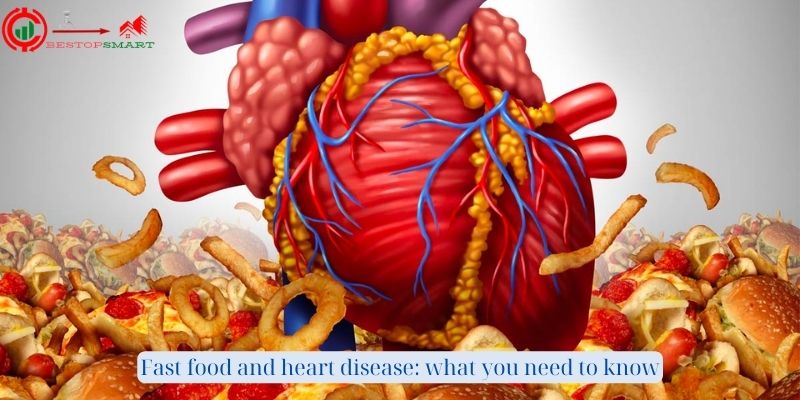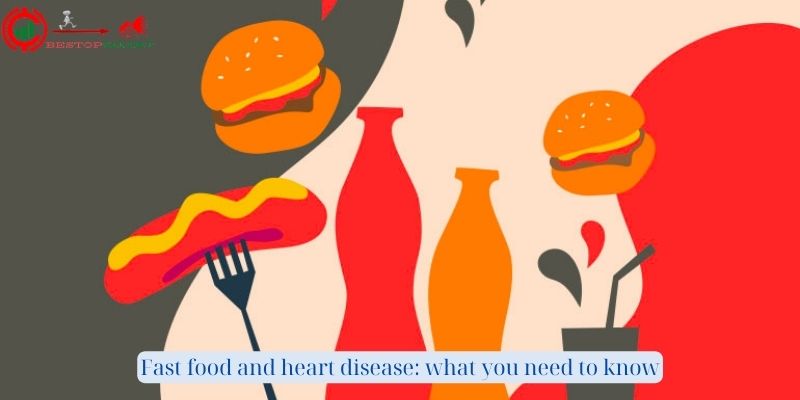Fast food and heart disease: what you need to know: Heart disease remains one of the leading causes of death worldwide, and its prevalence continues to be a cause for concern. In recent decades, there has been a significant increase in fast food consumption, which has raised questions about its impact on public health, particularly concerning heart disease. In this article, bestopsmart.com delves into the Fast food and heart disease: what you need to know, providing essential information to raise awareness and promote better heart health.
Contents
The Link between Fast Food and Heart Disease
Fast food, characterized by its convenience, affordability, and speed of service, has become a ubiquitous part of modern life. However, behind its enticing allure lies a nutritionally detrimental aspect that poses serious risks to heart health. Fast food often contains excessive amounts of trans fats, saturated fats, cholesterol, sodium, and refined sugars. These components are well-known contributors to heart disease.
Trans fats, commonly found in fried fast food items like French fries and chicken nuggets, have been shown to raise “bad” LDL cholesterol levels while reducing “good” HDL cholesterol. Similarly, the high levels of saturated fats found in fast food items like burgers and pizza can lead to the buildup of plaque in the arteries, increasing the risk of atherosclerosis and heart attacks.
The excessive sodium content in fast food contributes to high blood pressure, a major risk factor for heart disease. Diets rich in sodium can cause the body to retain water, increasing blood volume and straining the heart. Additionally, the refined sugars prevalent in fast food items like sodas and desserts can lead to obesity and diabetes, further elevating the risk of heart disease.
Understanding the Mechanisms
Fast food’s adverse impact on heart health goes beyond its nutritional components. Studies have shown that the consumption of fast food can impair blood vessel function, reducing their ability to dilate and increasing the risk of hypertension and heart attacks. Furthermore, the high levels of unhealthy fats and sugars in fast food can lead to inflammation and oxidative stress, damaging blood vessels and promoting atherosclerosis.
In addition to the direct physiological effects, fast food consumption is associated with unhealthy lifestyle habits. Frequent visits to fast food establishments often contribute to sedentary behavior and a lack of physical activity. Coupled with the high-calorie content of many fast food items, this can lead to weight gain and obesity, both of which are significant risk factors for heart disease. Moreover, fast food consumption tends to replace healthier food choices, resulting in a limited intake of fruits, vegetables, and other nutrient-dense foods necessary for maintaining heart health.
Scientific Studies and Statistics
Numerous scientific studies have explored the Fast food and heart disease: what you need to know. One study published in the American Journal of Clinical Nutrition found that individuals who consumed fast food more than twice a week had a significantly higher risk of developing insulin resistance, which is associated with an increased risk of heart disease and type 2 diabetes.
Another study published in Circulation, a journal of the American Heart Association, revealed that frequent consumption of fast food was associated with a 27% higher risk of developing coronary heart disease. These findings are consistent with other research that highlights the detrimental effects of fast food on heart health.
Tips for Making Heart-Healthy Choices
While the convenience and appeal of fast food can be hard to resist, making heart-healthy choices is essential for safeguarding cardiovascular health. Understanding how to navigate fast-food menus and make informed choices is crucial for minimizing the potential harm.
Reading nutrition labels can provide valuable information about the nutritional content of fast food items. Look for options with lower levels of saturated fats, trans fats, sodium, and added sugars. Many fast-food chains now provide nutritional information on their websites or in-store, enabling customers to make more informed decisions.
Identifying healthier options at fast-food establishments can also be a game-changer. Opt for grilled or baked items instead of fried ones, and choose salads, fruits, and vegetables as side options. Be mindful of portion sizes, as many fast-food meals contain far more calories than the body requires.
The Importance of Dietary Changes
Fast food and heart disease: what you need to know: While it’s essential to be cautious about fast food consumption, focusing on broader dietary changes is equally important for heart health. Emphasizing a balanced and nutritious diet can significantly reduce the risk of heart disease.
A heart-healthy diet should include a variety of fruits, vegetables, whole grains, lean proteins, and healthy fats. These foods provide essential vitamins, minerals, antioxidants, and dietary fiber that promote cardiovascular health. Limiting the intake of processed foods, sugary beverages, and high-fat items can further contribute to a heart-healthy lifestyle.
Public Health Initiatives and Policy Changes
Addressing the impact of fast food on heart disease requires a multi-faceted approach that involves public health initiatives and policy changes. Governments and organizations play a vital role in raising awareness about the risks associated with fast food consumption and promoting healthier dietary choices.
Advocacy for regulations and labeling requirements can empower consumers to make more informed choices when purchasing fast food. Clear and easily accessible nutritional information can help individuals understand the nutritional content of their meals, enabling them to make healthier decisions.
Conclusion
Fast food and heart disease are undeniably linked, and understanding this Fast food and heart disease: what you need to know is critical for safeguarding public health. The adverse effects of fast food on heart health are rooted in its high levels of unhealthy fats, sodium, and refined sugars, as well as the promotion of sedentary behavior and poor dietary choices. Scientific studies consistently highlight the risks associated with excessive fast food consumption, and public awareness is key to promoting heart-healthy lifestyles.








Leave a Reply